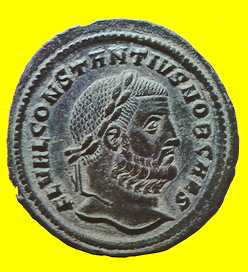 | 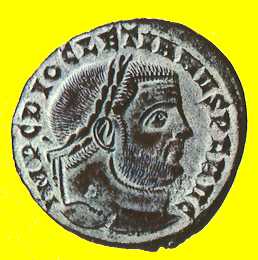 | 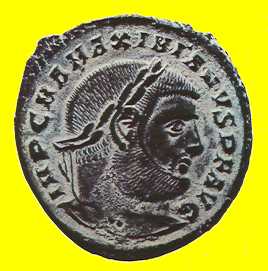 |
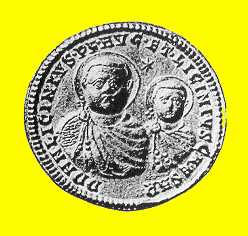 | 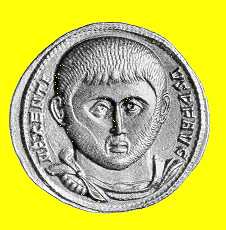 |
 |  |  |
 |  |
When Constantine the Great became at first co-emperor and later on sole-emperor of the Roman empire, he made many efforts in order to create a new state, a state that would continue to be as glorious as the Roman Empire of the earliest years. So he considered Christianity as an important factor for the consolidation of the state and his power and he decided to support openly the Christians who had been persecuted the previous three centuries. In other words Constantine needed Christianity and Christianity needed Constantine. However his intentions are very much criticized by scholars because some of them regarded that what he did for Christians was not motivated by pure religious feelings but rather from personal ambitions. It is a fact that his policy concerning Christianity has many contradictory elements which do not give us a clear picture of his true feelings. From the one hand he favored Christians but on the other he continued practicing paganism in his personal life. It may be probable that his controversial policy was a result of the continuation between religious and personal interests but this does not affect the fact that this policy benefited Christianity.
So, either from pure religious feelings or from ambition, Constantine helped Christianity to be recognized as a legal and strong religion within the Roman empire. The previous years ever since Christianity appeared in the empire, the Roman emperors-admirers of the pagan religion -were persecuting any Christian element. Nevertheless at about 300AD the religions of the ancient world were already in decay so Diocletian in his effort to protect these religions, which were inextricably tied with the existence of the state, issued a number of edicts for the persecution of the Christians. The continuity of the empire was seen to depend on its' past so any deviation was worthy of death. As Doerries says: "the Romans deified their own past unable to discover a new".(Doerries, 1960: p9-11). But by 311AD the imperial policy of persecution had been proven to be a failure (Gallerius, a supporter of this policy supported publicly it's weaknesses to solve the internal problems of his time). (Baynes, 1921:p3 ) Thus Constantine, with his presence in the administration of the Roman empire signals a new beginning for the future of the roman world.
To begin with, we must take into consideration some events which determined Constantine's position towards Christianity. The roman empire had been divided into four parts and Constantine, Likinus, Maxentius and Maximinus Daia were the four rulers. In the West Maxentius held Italy and concluded an alliance with the Eastern Caesar Maximin.In Rome Maxentius was supported by pagan prophets or in other words "the Gods of Rome had declared for Maxentius". Both Constantine and Maxentius ( the two opponents ) believed that divine favor was essential to the state's well being. So Constantine had to find a God who would "support" him. According to a story Constantine had a vision of a luminous cross, the so called labarum which was send by the Christian God in order to show Constantine that he was the divinity who would support him. This element of miracle is thus introduced as one of the causes of his conversion. It is true that through this vision Constantine tried to enhance his army by giving an ideal which had appealed to the masses , his intentions were to spread an "esprit de corps" in his army, to make it more solid and fanatical ( Odahl, 1976: p157 ).
Moreover, his decision to begin a struggle in order to take Rome under Christian ensign was rather an act of independence against the past, a past which was synonymous with the Roman empire and the pagan religion. Constantine moved really cleverly in the way he adopted Christianity. He did not attach himself to a group of people which had claims for a future political power. The pacifism of Christian religion was a rather reliable guarantee for the stability of his empire and above all, the stability of his personal power (Doerries, 1960:p34). In addition we must take into consideration his family's' and his personal beliefs. His father had been indifferent towards Christianity, in his domains he never practiced any persecutions. Moreover, his beliefs about an one and only God (monotheism) might have shaped Constantine's beliefs about Christians and in effect his toleration ( Doerries 1960: p37 ). Consequently, after Constantine's victory over Maxentius in early 313AD, Constantine and Lekinius met at Milan. The two emperors agreed upon a common policy concerning the government of their empire but the most significant part of their agreement was the one that recognized Christian religion, it acquired officially complete and unreserved freedom: "Everyone of those who have the same desire to observe the religion of the Christians is now freely and unconditionally to strive to do so without any interference or molestation" ( Keresztes, 1981:p42-43 ).
The edict of Milan spelled out complete religious freedom for the Christian church and granted the Christians the same regious privileges that were enjoyed by the official pagan religion, in fact the edict granted freedom to all religions. It has been argued that this edict was the first imperial constitution which recognized formally the Christian church as a legal corporation authorized to receive hold and administer properly. However, the edict issued in 311AD by Gallerius was aiming at turning Christians back to paganism. In 1891 AD, a German scholar O. Seek proposed a theory that there was no edict of Milan, the only one was that of Galerius. However, there was an edict of Milan, it was a confirmation of Galerius edict which was signed by Likinius and Constantine and was send to the governors of Asia Minor ( Vasiliev,1964: p51-52 ). This edict is not exactly Constantine's confession of faith, as long as its main element was impartiality for all religions. To him, Christianity looked equal to paganism. The significance of this act lays on the fact that it not only allowed Christianity to exist but it also placed it under the protection of the government. This was significant for the Christian religion as long as it ended the illegal position of the Christians' faith in the Roman empire and reduced paganism from being the only state religion to the rank of all other religions ( Brown, 1992:p91).
In the same year, after the edict of Milan, the two co-emperors, Constantine and Likinius faced an attack from Maximinus Daia. He moved from Syria through Asia Minor to Europe and seized Byzantium as well as Heraclea. So a battle took place which represented the two different worlds, the world of pure paganism and the world of freed Christianity. If Maximinus won, this would mean renewal of the Christian persecutions. The result of this battle was the victory of the two co-emperors. Nevertheless their unity was not meant to last for long, as long as a conflict broke out between them and in 323 AD Constantine marched against Likinius, defeated him and incorporated all his domains ( Burckart 1949: p262-265). After this battle in Chrysopolis , Constantine declared that his policy concerning religion remained unchanged : He issued an edict according to which he would first deal with the restoration of the Christian's personal rights and then with the rights of property . This edict is the decisive step which ended once and for all the persecutions of the Christians. In addition he issued another edict which was preserved by Eusebius and it is actually a confession of faith, he says "the violence of the polytheism ending in destruction". He desires a peaceful situation among his people , they should remain in concord for the common good of the "inhabited world" (Baynes 1951:p16-18 ).
Thus Constantine as a sole emperor he was free to elevate the Christian religion at a level that it would become the most powerful religious force in the empire. So he decided to take a number of measures in order to enhance Christianity. His main target was not the "otherworldly hope" of Christianity but his success on earth. As Odahl says " his Christian faith was enveloped with Roman religious conceptions, his Christ was more pugnacious than pacific" ( Odahl, 1976: p120 ).
 |
So Constantine regarded his role as a benefactor for the Christian Church and he favored it in the imperial religious legislation. While he was a co-emperor with Likinius he initiated a series of legislative constitutions which elevated the Church and its' clergy to a privileged position within the Roman society. first of all he exempted the Christian hierarchy from the burden of public duties such as road repairs, building of public works, tax collection and military service. Such relieves were granted only to traders and generally professions of public utility. By this action the emperor recognized Christianity as an organization of public usefulness. As Constantine said: the clergy exercised an activity that benefits the state and must therefore be rewarded with privileges ( Alf_ldi, 1948: p47). It is worth noticing that all these measures were referring to the clerical hierarchy only and not to the common Christians. This is understood if we take into consideration the fact that the Christians had been expanded in numbers all over the empire so these measures would be impractical if they applied on them. Moreover, Constantine was interested in a partnership with the hierarchy of the church because these people could help him in the administration of his state ( Odahl, 1976: 143-145 ). In the year 318 AD an imperial constitution granted authority to the Christian Episcopal courts to issue decisions on cases brought before bishops from the secular courts. Constantine explained that this was done because religious courts were more flexible as long as they were not "tortured" by states bureaucracy. This decision acknowledges the significance of the Christian law over human affairs and gave privileges to bishops, privileges which had a public character. Still in 321 AD Constantine recognized the Christian day of worship as a legal holiday. Sunday had been the day of the week during which Christians were gathered in order to worship their God. So, by proclaiming this day an official holiday , he made it easier for Christians to attend their services and he declared publicly his belief that the welfare of the state depended upon the Christian worship of the one and only God. The use of pagan terminology (Sunday-the day of the sun ) was due to the fact that he did not want to upset the empire's pagan majority. (Odahl, 1976: 147-148 )
Further, Constantines' legislation not only raised the position of the church and its clergy in the roman society but it also attempted to spread the Christian principles among the Roman population. So, from 319 AD until the end of his reign, he issued a series of constitutions which indicate a Christian influence. he ordered severe penalties against those who were guilty of rape , adultery and prostitution, while he made the process by divorce more difficult. In addition, he attempted to protect prisoners from the brutality of jailers, slaves from their masters and children from their parents. Still, to widows and orphans he offered state support. By these decisions he tried to fuse Roman law with the strictness of Christian morality and the kindness of the Christian brotherly love ( Odahl, 1976: 151-152 ). As we see Constantine used Christian ideas in his legislation and Christianity found the man that would spread without any objection it's ideals.
Yet, when he succeeded in adding the North African provinces to his domains he had only ordered the complete restoration of all church property but also arranged for the payment of contributions to the catholic committees of those provinces through his financial administrators. He gave the bishops money, buildings and above all land. Constantine, ordered for the creation of new sanctuaries throughout his empire while the provincial governors were instructed to give bishops churches, the production of Bibles and the expansion of charities for the orphans, the widows and the poor. His gratitude towards the Christian church motivated his offerings to the church. He wanted to erect monuments of his thanks to the Christian God and provide large sanctuaries that would attract pagans to this religion ( Alf_ldi, 1948:46-47).
Another step which enhanced the relationship between the church and the state was Constantine's decision to call Christians to the higher administration (there were Christians but not so many). In the synod of Artes (314 AD) Constantine regulated the position of the Christian governors by using Christian disciplines. With this decision Christian governors should not do anything to "infringe" Christian disciplines, they should not take part in acts of pagan sacrifices ( sacrifices which till then, had been bound to the functions of their authority ). This was due to the fact that Christian governors on the days of imperial festivities, failed to sacrifice for the emperor (as a confession of their loyalty). (Alf_ldi , 1948:p49 ). Moreover, the number of Christians in public services increased after Constantine's conversion. The appearance of Christian symbols ( crosses) on the coins after 312 AD indicated that Christians were rising to important posts within the imperial monetary and minting administration while by 321 AD a Christian had put at the old Roman office of Consul (Brown, 1992:p39 ).
Furthermore, another aspect that shows us the interaction of Constantine's ideas with that of Christianity was the sector of the army, he tried to "Christianize" the roman army. We must not forget that he was a soldier-emperor and he was aware of the fact that the security of his throne and his empire depended upon the efficiency and the loyalty of the Roman army. His personal belief that the Christian divinity was the only powerful god "who controlled the fortunes of war and peace" affected his regulations concerning the organization of the Roman army. He was concerned for his soldiers welfare during and after their service. There were strict regulations imposed which protected soldiers payments. Moreover, the promise for land, money and tax exceptions were meant to increase the attractiveness of a military career. All these Christian-oriented principles were enough to restore Roman army and lead his forces to an unbroken series of victories over the pagan opponents of Constantine. In other words, the roman military establishment was no longer in the camp of idolatry. Under his leadership it worshipped a supreme Divinity, marched behind the Christian "Labarum" and offered protection to the state and to the church. However ,all these measures were not enough to change the beliefs of the individual soldiers who remained pagans ( Odahl, 1976: 171 ) Still, Constantine tried to attract in his army more Christian people but this was a problem by pacifism and love so they rejected militarism . Nevertheless, Constantine claimed to be a "servant" of the Christian God and had as his mission the establishment of a new era of Christian domination. After his conversion, the Christian church altered it's preaching and it seemed quite proper for Christian citizens to support an emperor who was favoring them, so military service was an appropriate form of such support. So in an effort to strengthen his soldiers spirit he introduced religious symbols on their arms and the Labarum became a symbol of rule, power and religion. ( Buyckhardt, 1951: p41 ).We see that Constantine could manipulate Christians in such a way as to serve his interests without any resistance, even if his decisions were coming in contradiction with their Christian ideals.
In conclusion, one may say that the co-operation between the Christian church and the state which was initiated by Constantine's policy , brought benefits to both partners. The Christian religion gave a strong support to the imperial authority. The church for its' part, got from the state various material endowments as well as support for its' activities and for its' struggle against its' pagan enemies. However, this required a degree of dependency on the state and this is seen better if we take into consideration the fact that Constantine was the one who was dominant during the council of Nicaea, a council which was dealing with christological controversies. As Burckhardt says "the Christian church has nothing to lose in this terrible though politically grandiose figure just as paganism would have nothing to gain by him ( Burckhardt, 1949:p290 ). The sincerity of his feelings towards Christianity is difficult to be revealed. His actions show a unique personality who tries to keep a balance between his personal feelings and his thirst for power. His life seems a fight between paganism and Christianity. However, his efforts to incorporate Christianity within the ranks of his state is considered as successful and we must not forget that he initiated a new era for a revived Roman empire where the royal power was the dominant characteristic, a characteristic that kept the Byzantine empire alive for more than one thousand years.